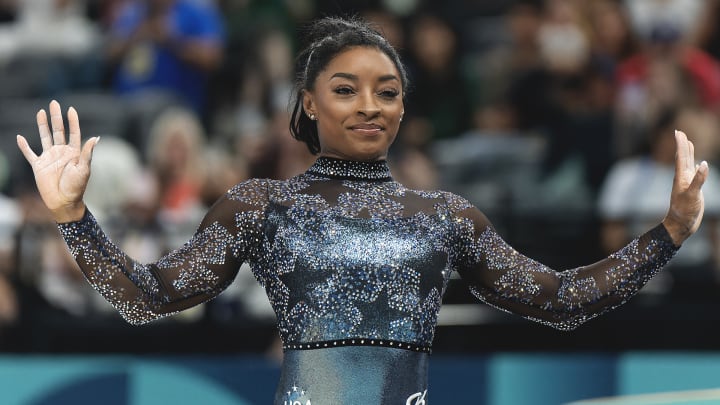Biles Shakes Off Injury and Shines in the U.S.’s Dominant Paris Debut

Three years almost to the day later, there Simone Biles was again, alone on the floor of an Olympic arena, her thoughts her own, as the world wondered if she would continue competing. Just as she did in Tokyo, Biles huddled with U.S. gymnastics team doctor Marcia Faustin. Just as she did in Tokyo, Biles briefly disappeared into a back hallway. Just as she did in Tokyo, Biles gave viewers reason to hold their breath.
But Biles is in Paris, and she seems to have left the twisties—the vertigo that sidelined her last time—behind. This time she returned to the floor, limping a bit on her newly taped left calf, and produced simply an astonishing performance to take the lead in nearly every category in the qualifying session on Sunday.
“Incredible,” said U.S. technical lead Chellsie Memmel.
After it was over and she had sealed the U.S.’s spot in the team final—and all but sealed her own in three event finals—Biles bounded to the edge of the uneven bars podium, took a bow, waved and blew a kiss to the crowd.
Biles’s 59.566 was the second best score of the Olympic cycle among gymnasts in the field, second only to her own all-around in the first session of this spring’s national championships, when she produced a 60.45. (She holds the other eight of the top 10, too.) Even on one foot, Biles is the best of all time.
With three of five subdivisions still due to compete on Sunday, as of this writing, the Americans left themselves in good position: first overall in the team competition, for which they have guaranteed a spot; first for Biles and second for reigning Olympic champion Sunisa Lee in the all-around; first for Biles and second for Jade Carey in the vault; third for Sunisa Lee in the uneven bars; second for Biles and third for Lee in the balance beam; and first for Biles and second for Jordan Chiles in the floor exercise. (Chiles also ranked third in the all-around, a devastating 67 thousandths of a point behind Lee, but Olympic rules only allow two gymnasts per country to advance.)
The gymnasts declined to address the media on their way out of the Bercy Arena, but head coach Cécile Landi said that during warmups for the floor exercise, Biles had aggravated a calf injury she suffered a few weeks ago. Landi declined to characterize the severity of the injury—“I’m not a doctor,” she said—but insisted that there was no concern Biles would have to withdraw from the rest of the competition. “She felt better at the end,” she said.
Landi described Biles’s performance as “pretty amazing” but added that it was “not perfect, so she can improve a little bit.”
The energy surrounding the group was completely different than it was three years ago, when they qualified a full point behind the Russians amid mistakes by every gymnast. But the Russians are not here this time, a punishment for their country’s war in Ukraine, and this time, when the Americans made errors, they rebounded.
Memmel acknowledged some visible nervousness from 16-year-old Hezly Rivera on the balance beam, which opened the day, but she then performed well on the uneven bars. Carey, the reigning Olympic floor exercise champion, went out of bounds twice on the apparatus and then bailed out of her last pass to miss the final, but she gathered herself and hit her vault. Biles made a few missteps, mostly on account of her overwhelming power, but she seemed in control of her emotions.
And at first, it was her mental state that offered the most questions. The twisties affect gymnasts’ bodies, but they occur in their brains. “The wires just snapped,” she said in Tokyo. The public first saw their effects during the qualifying session, when she nearly fell out of her vault and stumbled backward on her dismount from her beam routine. And then came the team final, when she bailed out of her vault and withdrew from the competition. She pulled out of event after event, eventually stripping the twisting elements from her beam routine and gutting it out to earn a bronze medal that she called the most meaningful of her storied career.
She took a year off from gymnastics and two years off from competition. She saw her therapist weekly and took her Lexapro, used to treat anxiety and depression. She practiced until she believed she could do it again. When she returned, she seemed healed. Still, she did not seem ill in the leadup to Tokyo. Landi admitted on Friday that she was “breathing a little easier” after Biles successfully completed the practice session on the competition equipment.
Before Sunday’s competition began, Biles sat silently, staring off into the middle distance while stretching her legs and steadying her breathing. She appeared to whisper, “You got this” to herself before she mounted the beam. She landed her routine solidly, and her coaches and teammates jumped and cheered.
As the team proceeded to the floor exercise, she noticed Snoop Dogg dancing in the stands, so she did the same. Even after her injury made Memmel “feel like I was gonna puke,” Biles remained in good spirits. After her first practice vault, she dropped to her knees and crawled most of the way back to the start, then hopped the final few yards on her right foot. Her teammates were cackling. Memmel was less amused. “That’s not appropriate for me to say what I was thinking,” she said with a laugh.
Biles’s next test will come on Tuesday, in the team finals. She seems ready for it: She grinned and waved as she left the arena. It must be a relief to be stricken with a problem doctors can treat.
